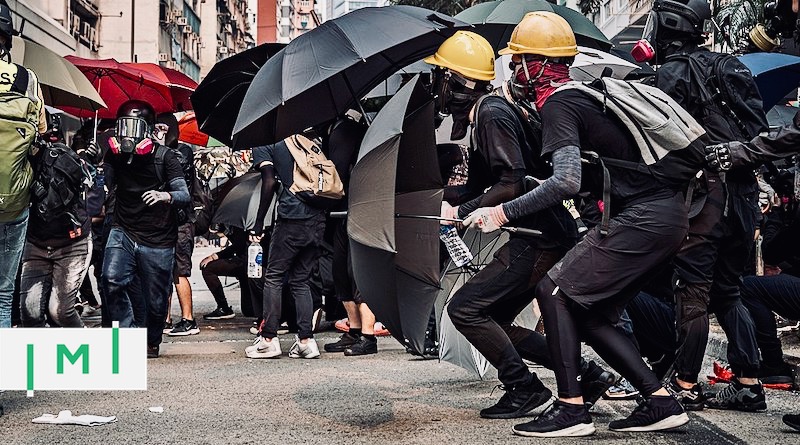Hong Kong’s Already-Hot Migration Market Boils Over Following National Security Law Announcement
The Hong Kong emigration market, already simmering since protests began in earnest last year, is now boiling over following Beijing’s announcement that it intends to impose a new national security law in the territory.
Thousands of Hong Kongers have taken to the streets this week to protest the planned introduction of a new “national security law” that would pave the way for China to set up its own law enforcement agencies within the territory, which would go a long way toward effectively ending the “one-country-two-systems” protocol that’s been in place (but gradually eroded) since the 1997 handover.
Among many other provisions, including a path to eventual democracy and the protection of civil liberties like freedom of expression and assembly, Article 23 of the Basic Law – often referred to as Hong Kong’s “mini-constitution”, a document agreed to by the UK and China as part of the terms of the handover – mandates that Hong Kong eventually enact its own law on national security.
The Hong Kong government first attempted to pass a national security law in 2003 but relented following massive protests. After further mass-demonstrations in 2014 and again last year (over the proposed extradition bill, later withdrawn), Beijing has decided that its rubber-stamp lawmaking body, the National People’s Congress, will circumvent Hong Kong’s Legislative Council by passing a national security law on Hong Kong’s behalf, without any input whatsoever from its residents.
The law would criminalize acts secession, subversion, terrorism, and foreign-power interference in Hong Kong, the interpretations of which would be at Beijing’s discretion. The draft law will almost certainly be adopted this week.
Democracy and independence proponents in the SAR call it “the end of Hong Kong” and point out that even Chinese officialdom make no secret about the law’s intent:
China Daily, an English-language Communist Party mouthpiece, indicated the law would help deter further protests: “The introduction of the legislation will provide the legal basis for concrete actions to check the escalation of violence in [Hong Kong], and act as a deterrent to expedite the restoration of public order.”
While the getting’s good
The news sent interest in migration soaring, say the city’s consultancies.
Deluxe Immigration Consultancy LTD – interviewed in Hong Kong Economic Times – reported a ten-fold rise in inquiries about moving to Taiwan last week.
Harvey Law Group, a large international investment migration specialist headquartered in Hong Kong, confirmed the tendency.
“It is, indeed, very, very busy,” said Jean-Francois Harvey, the firm’s Global Managing Partner. “Definitely a big jump in inquiries last week but even more today after yesterday’s protests in Causeway Bay and Wan Chai.”
But Harvey also urges observers to put things in perspective, explaining that emotionally prompted bursts in inquiries are a common occurrence during Hong Kong’s events of political upheaval, an observation he also made last June at the heat of the extradition-bill protests. This type of interest, he remarks, tends to fizzle out once the realities of the work and investment involved in immigration actually involve become clear.
“A big part of our job is to first calm the client down. Then we explain the options they have, according to their core goals, such as education or reestablishment elsewhere.”
While a large part of such fear-and-shock driven demand tends to stop at the inquiry stage, Harvey says that for the cheaper, quicker programs, the effect can translate into tangible action.
“Quick solutions like Taiwan and Malaysia’s M2H will be the winners,” he says, while destinations like Canada and Ireland, which have persistently high demand among Hongkongers, will also come out on top.
Data analysts found a correlation between the keywords “national security law” and “immigration” in online search engine requests, according to Hong Kong Free Press. The pattern, said the analysts, implied that “the public are almost searching ‘national security law’ and ‘immigration’ simultaneously.”
Democracy groups on Friday called on the UK, China’s co-signatory to the 1984 Joint Declaration, to grant right of abode on the British Isles to British Nationals Overseas, a status that applies to tens of thousands of Hongkongers born before the handover. The UK government initially said the legal obstacles to paving the way for such a policy would be insurmountable, but advice from one of the country’s most prominent immigration QC’s indicated there was nothing in the Joint Declaration to prevent such an offer, according to The Guardian.
“BN(O) passports were always a compromise, dependent in part on the rights guaranteed in the handover settlement,” said Tory MPs Bob Seely and Imran Ahmad Khan. “The introduction of the national security legislation means that that settlement is essentially dead. As such there are clear legal and practical grounds for looking again at this matter.”
Meanwhile, anti-China sentiments around the world following the pandemic, as well as domestic Chinese news’ painting a picture of Western countries’ poor handling of the outbreak compared to that of Beijing, is driving a trend in the opposite direction among mainlanders, according to sources cited in the South China Morning Post.
“I cannot help but worry about whether my son will be discriminated against in the foreign school – whether he can get the same respect and opportunities compared to a few years ago,” said Gou Hua, a Shenzhen resident whose son is planning to take his Freshman university year in California this autumn.
Christian Henrik Nesheim is the founder and editor of Investment Migration Insider, the #1 magazine – online or offline – for residency and citizenship by investment. He is an internationally recognized expert, speaker, documentary producer, and writer on the subject of investment migration, whose work is cited in the Economist, Bloomberg, Fortune, Forbes, Newsweek, and Business Insider. Norwegian by birth, Christian has spent the last 16 years in the United States, China, Spain, and Portugal.



